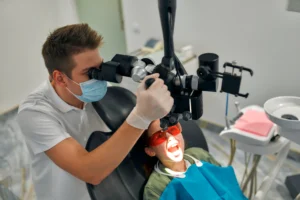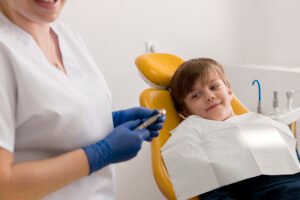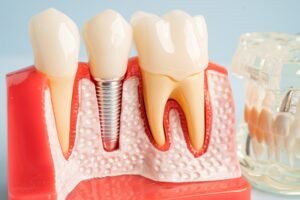Choosing the right pediatric dentist is a crucial decision for your children’s oral health journey. Discovering the qualities of a pediatric dentist can truly shape your child’s dental experience. Beyond just cleanings and check-ups, an excellent children’s dentist provides a foundation for a lifetime of healthy smiles. At Little Smiles of Beverly Hills, led by Dr. Sepehr Nassiripour, we understand the unique needs of young patients and strive to embody the very best qualities in pediatric dental care. Our clinic in Beverly Hills is dedicated to providing top-tier service, making us a leading choice for a pediatric dentist in the area.
So, what should you seek in an exceptional pediatric dentist? Here are key qualities of a pediatric dentist that make a significant difference, especially here in Beverly Hills:
1. A Compassionate and Calm Demeanor: A Core Quality of a Pediatric Dentist
Children need to feel safe, happy and understood in the dental chair. Consequently, an excellent pediatric dentist is inherently patient, kind, and courteous, creating a calm and reassuring atmosphere. They know how to interact with children, ensuring they feel comfortable and pain-free throughout their visit. This is especially vital for children with sensory issues, where a compassionate approach can make all the difference. Furthermore, this hallmark of care is what you’ll find from a top pediatric dentist in Beverly Hills. Indeed, these are fundamental qualities of a pediatric dentist that foster trust.
2. Exceptional Skill and Expertise with Children: Defining an Excellent Children’s Dentist
Pediatric dentistry is a specialized field that requires a unique understanding of child development and behavior. Thus, a top-tier children’s dentist, the kind of pediatric dentist you want for your family, is not only highly professional and thorough in their practice but also possesses a deep understanding of how to treat kids effectively. Moreover, they are adept at handling dental anxiety, transforming potentially stressful visits into positive experiences, something we pride ourselves on in Beverly Hills. Look for these specific skills among the qualities of a pediatric dentist.
3. A Welcoming and Child-Friendly Environment: A Key Quality of a Pediatric Dentist’s Office
The dental office itself plays a significant role in a child’s comfort. Therefore, an excellent pediatric dental practice fosters a fun, welcoming, and family-oriented environment. From the moment you walk in, the atmosphere should be designed to put children at ease, making their visit memorable for all the right reasons. Little Smiles of Beverly Hills is dedicated to creating such an environment, ensuring every child, especially during their first visit, has a positive experience. Ultimately, this is why we are a top choice for a pediatric dentist in Beverly Hills.
4. Comprehensive Services and Accessibility: What a Top Pediatric Dentist Offers
A truly excellent pediatric dentist offers a wide range of services to address all aspects of a child’s oral health. This includes preventative care, education, and minimally invasive practices. Specifically, look for a practice that provides a full spectrum of holistic pediatric dental services, understanding the connection between oral health and overall well-being. Services such as IV pediatric sedation dentistry, fillings and crowns, emergency children’s dentistry, special needs children’s dentistry, and children’s sports dentistry are indicators of a comprehensive approach. Furthermore, accessibility is also key, ensuring you can get the care your child needs when they need it, a standard we maintain for every pediatric dentist on our team in Beverly Hills.
5. A Whole-Child Approach: The Philosophy of an Excellent Pediatric Dentist
Beyond treating teeth, an outstanding pediatric dentist considers each child’s unique needs, diet, lifestyle, and comfort level. Furthermore, they are willing to take the time to discuss your child’s particular situation and needs with you, fostering open communication. Dr. Nassiripour at Little Smiles of Beverly Hills exemplifies this “whole-child approach,” ensuring every child’s journey to a healthy smile is personalized, utilizing advanced technology and treatments like gentle root canals, SDF, and resin infiltration. Clearly, this holistic view is a key quality of a dedicated pediatric dentist.
6. Specialization in Special Needs Dentistry: A Vital Quality for a Pediatric Dentist
For children with special needs, finding a dentist who is incredibly patient and understanding is paramount. Thus, an excellent pediatric dentist will have specialized expertise and a gentle approach to ensure these children receive the best possible care tailored to their individual requirements. Dr. Nassiripour is renowned for his expertise as a special needs dentist for kids in Beverly Hills, highlighting the importance of this quality.
Understanding the Difference: Good vs. Excellent Pediatric Dental Care
| Feature | Good Pediatric Dentist | Excellent Pediatric Dentist |
|---|---|---|
| Approach | Treats dental issues as they arise. | Focuses on holistic care, prevention, and overall well-being. |
| Child Comfort | Manages basic fears. | Actively creates a fun, calming, and reassuring environment for all children, including those with anxiety or sensory issues. |
| Communication | Provides information about procedures. | Takes time to discuss the child’s unique needs, diet, and lifestyle with parents. |
| Services | Offers standard cleanings, fillings, and extractions. | Provides a full spectrum of services, including sedation, special needs care, and advanced preventive treatments. |
| Environment | A clean, functional dental office. | A truly child-friendly space designed to be welcoming, fun, and comfortable. |
Export to Sheets
Key Services Offered by an Excellent Pediatric Dentist
| Service Category | Examples | Benefits for Your Child |
|---|---|---|
| Preventive Care | Routine check-ups and cleanings, fluoride treatments, dental sealants, oral hygiene education for parents and children. | Prevents cavities and gum disease; furthermore, it establishes good habits early, and reduces the need for extensive treatments. |
| Restorative Care | Fillings (resin/composite), crowns (stainless steel, white), gentle root canals for primary teeth. | Repairs damaged teeth, alleviates pain, maintains function, and preserves space for permanent teeth. |
| Specialized Care | Pediatric sedation dentistry (nitrous oxide, oral sedation), special needs children dentistry (tailored care for diverse needs), children’s sports dentistry (mouthguards, injury management). | Ensures comfortable and safe treatment for anxious or special needs children; additionally, it protects against sports injuries. |
| Emergency Care | Prompt attention for dental injuries (e.g., knocked-out teeth, chipped teeth, toothaches), infections. | Alleviates pain, prevents complications, and saves teeth, ultimately providing peace of mind for parents. |
| Holistic Approach | Guidance on diet and nutrition for oral health, minimally invasive treatments (e.g., SDF – Silver Diamine Fluoride, resin infiltration), monitoring of growth and development, early orthodontic evaluations. | Addresses overall well-being, minimizes discomfort, promotes natural tooth preservation, and identifies potential issues early. |
Export to Sheets
Your Questions Answered: FAQs About Pediatric Dental Care
1. Why is a pediatric dentist different from a general dentist? Pediatric dentists complete an additional two to three years of specialized training beyond dental school, focusing specifically on the unique oral health needs of infants, children, adolescents, and those with special healthcare needs. Consequently, they are experts in child psychology and behavior management, creating a comfortable and positive experience. Every pediatric dentist aims for this distinction.
2. At what age should my child first see a pediatric dentist? The American Academy of Pediatric Dentistry (outbound link) recommends that a child’s first dental visit occurs by their first birthday or within six months after their first tooth erupts. This “dental home” approach allows for early detection of potential issues and provides parents with crucial preventive guidance from a pediatric dentist.
3. How often should my child visit the pediatric dentist? Generally, children should visit the pediatric dentist every six months for routine check-ups and cleanings. However, your dentist might recommend more frequent visits based on your child’s individual oral health needs or risk factors for cavities.
4. What if my child is afraid of the dentist? It’s common for children to have dental anxiety. Therefore, excellent pediatric dentists are trained to handle these fears with patience, kindness, and various techniques, including “tell-show-do,” positive reinforcement, and sometimes, gentle sedation options like nitrous oxide (laughing gas) to ensure a comfortable visit.
5. What is sedation dentistry for kids? Pediatric sedation dentistry uses medication to help children relax during dental procedures. Options range from nitrous oxide (laughing gas) for mild anxiety to oral conscious sedation for more extensive treatments. The type of sedation is chosen based on the child’s needs, health, and the procedure’s complexity, always prioritizing safety.
6. How important is preventive care? Preventive care is the cornerstone of pediatric dentistry. Regular check-ups, cleanings, fluoride treatments, and dental sealants significantly reduce the risk of cavities and gum disease. Ultimately, it’s much easier and less invasive to prevent problems than to treat them later.
7. What kind of diet promotes good oral health for kids? A balanced diet low in sugar and acidic foods is crucial for good oral health. Encourage plenty of fruits, vegetables, lean proteins, and dairy products. Conversely, limit sugary drinks, sticky candies, and frequent snacking, as these can contribute to tooth decay.
8. Do pediatric dentists treat special needs children? Absolutely. Pediatric dentists receive specialized training to care for children with diverse physical, developmental, emotional, and intellectual challenges. They are equipped to adapt their approach, environment, and techniques to meet the unique needs of every child, ensuring safe and effective dental care.
9. What should I do in a dental emergency? In a dental emergency, such as a knocked-out tooth, severe toothache, or fractured tooth, contact your pediatric dentist immediately. Many practices have emergency contact information. Timely action can often save a tooth or prevent further complications.
10. How can I make my child’s first dental visit positive? Talk positively about the dentist, read children’s books about dental visits, and avoid using words that might cause fear (like “shot” or “drill”). Keep it light and fun! A positive first experience sets the stage for a lifetime of good oral hygiene habits.
Making the Best Choice for Your Child’s Oral Health
When seeking an excellent pediatric dentist, prioritize those who combine compassionate care with specialized expertise in a welcoming environment. These qualities of a pediatric dentist ensure your child receives not just dental treatment but a positive and empowering experience that promotes lifelong oral health. Finding a pediatric dentist with these qualities in Beverly Hills ensures your child gets the best care. Understanding the right qualities of a pediatric dentist will help you make the best choice for your child’s oral health journey.
Sources:
- Little Smiles of Beverly Hills: Little Smiles of Beverly Hills Official Website
- BH Kids Dental: Qualities of an Excellent Pediatric Dentist
- Dr. Rhonda Hogan’s Blog: 8 Qualities of an Excellent Children’s Dentist



